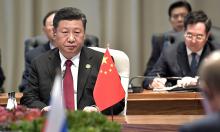Can Russia Use the Veto? - 3 March, 2003
A visit of Russia Foreign Minister Igor Ivanov to Beijing last week was remarkable  for its propaganda activity. There were published two Russia-China communiquйs dedicated to the visit. Besides, a press-conference was held in a Beijing airport on Ivanov’s arrival, a press-conference was held in Russia’s Embassy in China before his departure; in the network of the visit an unprecedented online conference was held for readers of the newspaper People’s Daily on the Internet. But did this publicity parade give answers to the pressing questions: will a war be waged in Iraq and how the states rated second and third in the world rating of military forces are going to prevent it?
for its propaganda activity. There were published two Russia-China communiquйs dedicated to the visit. Besides, a press-conference was held in a Beijing airport on Ivanov’s arrival, a press-conference was held in Russia’s Embassy in China before his departure; in the network of the visit an unprecedented online conference was held for readers of the newspaper People’s Daily on the Internet. But did this publicity parade give answers to the pressing questions: will a war be waged in Iraq and how the states rated second and third in the world rating of military forces are going to prevent it?

Starting with January 27, 2001 (when George W. Bush announced his “axis of evil” doctrine), the previous seven days can be considered the 56th week in the history of humanity’s struggle against the third world war provoked by the USA. Over this period, political experience of people has considerably improved. We all have become witnesses of wonderful collisions:
- we were driven into despair by betrayals of allies in the Council of Mutual Economic Assistance and at the same time were encouraged by turncoats from the previous “cold war camp”;
- advocates of “freedom” and “velvet revolutions”, like Vaclav Havel, rushed to Baghdad, but Desert Storm veterans attacked Washington with their protests;
- Britain’s Laborites proved to be more conservative than even France’s conservatives;
- Opponents of Iraqi war in America were more active than those in Russia;
- The key issue, positions of Russia and China concerning the Iraqi problem have been vague for more than a year already. They are so vague that even Saddam Hussein during his recently held three-hour dialogue with Russian Communist leader Gennady Zyuganov and other parliamentarians was puzzled why France and Germany, but not Russia, were the leaders of peaceful settlement of the Iraqi crisis.
However, it is not ruled out at the same time that the “vagueness” in this case originates from the foundation of political and other experiences of the “number two” and “number three” world powers.
It is perfectly evident for any reasonable man that the anti-Iraq sanctions introduced by the UN Security Council, as well as compulsion of Iraq for a humiliating inspection procedure is nothing else than usage of “double standards”, trample of the justice and equality principles and of the right of any weak country for self-defense from stronger states.
Iraq has a right to use the same instruments of war that Israel and the USA do. It is enough to compare words of Saddam Hussein said at the above-mentioned meeting with Russian parliamentarians and texts of Bush’ hysterics in order to make sure that the Iraqi leader deserves much more trust than America’s president. The advantage of the latter is based upon military force, not intellect. In this case it is more immoral to indulge in “the right of the strong” than in the times when Japan attacked China and when Germany occupied Czechoslovakia.
Nevertheless, it is not ruled out that tactics employed by Russia and China have been more effective until recently. If some of them had imposed the veto half a year ago, probably Bush would have commanded to attack Iraq in a temper. But in fact he was pulled the wool over his eyes weeks after weeks: he was promised that the whole of the world would soon give him carte blanche for a total mess. Bush was patiently waiting, but meanwhile no war was started.
But the time is going by; within the past 56 weeks Bush’ authority in Europe, the USA and in the whole of the world declined; this fact in its turn gives more chance to avoid a catastrophe. At the same time, new risk factors are being formed. Moscow and Beijing must be given credit for their attempts to coordinate positions concerning both poles of the notorious “axis of evil”, Iraq and North Korea. What is after all the result of a diplomatic contact of both countries, China and Russia that call themselves strategic partners?
Words of the joint communiquй with appeals to Iraq “for a wider, more active and effective cooperation with inspectors with a view to create conditions necessary for settlement of the Iraqi problem with political methods” looks like another curtsey to Washington. At the same time, observers think that the meeting doesn’t exceed the limits of another “conference of psychiatrists”, because at the end of Beijing’s “publicity parade” (at the press-conference in the Russian Embassy, February 28) Russian Foreign Minister Igor Ivanov pronounced words that later caused a wide resonance in the world. “Russia has the veto, and it will certainly enjoy the right if it’s important for international stability.”
The words were pronounced at an appropriate moment: the world has already understood that although Bush looks and behaves rather bellicose, he doesn’t wish at all to launch a large-scale military action contrary to the rest of the world. If the Russian minister managed to achieve some results in the network of Russian-Chinese trust, this is certainly an appropriate moment for making such a statement.
Andrey Krushinsky
PRAVDA.Ru
Beijing
China
Subscribe to Pravda.Ru Telegram channel, Facebook, RSS!


